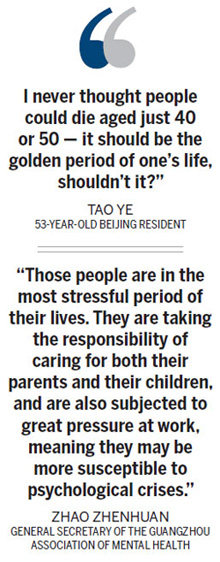Mid-life diseases up in China
By Yang Wanli (China Daily) Updated: 2014-04-15 08:33
A new perspective
Tao clearly remembers the last time she saw her classmate, who had cancer of the colon. "She was nicknamed 'Little Fatty' because of her full figure. But when I stood next to her bed in the hospital, I could only see a skinny woman. She was wearing a pair of gold earrings, but her ears looked like pieces of wrapping paper, thin and brown," she said.
A few days after that meeting, Tao learned of her friend's death when she noticed a wreath bearing her name in a funeral supplies shop. A second classmate, who had cancer of the rectum, died a year later. Tao was alerted to the severity of her condition when she noticed that the veins in her hands were dark brown, not blue, as a result of the chemotherapy she had undergone.
"It was hard for me. Several months before I knew of her illness, we traveled to the hospital together to visit our friend who had colon cancer," Tao said. "She had a 5-year-old daughter. Her death was a real shock to her family."
Following the women's deaths, the 20 surviving members of the class began socializing with each other more regularly, meeting at specially arranged parties or in restaurants. "Our relationships have become closer. We also spend more time with our families and other friends. Nothing is as certain as death," she said.
Her friends' deaths shocked Tao, and, having been the fattest girl in her primary class, she decided to lose weight for health reasons. After two years of exercise and a healthier diet, she lost 15 kilograms. "The deaths of my two classmates reminded me to have a stronger awareness of the importance of health," she said.
Ikang Guobin Healthcare Group, one of China's biggest healthcare companies, released a report based on more than 110,000 individual healthcare surveys conducted nationwide in 2012. The report indicated that middle-aged people, those aged 40 to 60, had the highest risk of health problems, especially obesity, high blood pressure, and cardiac conditions.
However, health problems vary from region to region. In Shanghai in 2012, the incidence rate of fatty liver and thyroid problems was higher than in many other regions, and almost three times higher than in the provinces of Zhejiang and Guangdong. In Beijing, nearly half of those surveyed were either overweight or clinically obese.
Chronic conditions
Although middle-aged people are at risk from chronic conditions, such as high blood pressure, obesity and diabetes, cancer is one of the biggest killers in China. It's one of the top three causes of death, accounting for more than 2 million annually, and the incidence of the disease has been rising in recent years.
"Two of my friends have suffered from cancer. One, a 27-year-old woman, had breast cancer, and the other, a 29-year-old man, had nasal cancer," said Yang Li, 29, a freelance journalist in Beijing, who added that some of her parents' colleagues in their 50s have also had the disease.
Air pollution, work-related stress, poor diet and an unhealthy lifestyle are believed to be responsible for the growing threat to middle-aged people, according to experts.
A study published in the journal Proceedings of the National Academy of Sciences in July 2013 and conducted by an international team of researchers, said severe pollution - which has led to an increased incidence of strokes, heart disease and cancer - has slashed an average five and a half years from the life expectancy figure in northern China.
According to the study, the number of harmful particulates in the north is now 55 percent higher than in the south, a level of pollution the researchers described as "extraordinary".
"Modern life puts greater pressure on the 'elite' group in society. They are always in the business of progressing at work or making their fortunes, and they seldom slow down to give their minds and bodies a rest," said Bai Huiliang, president of the China Nonprescription Medicines Association.
Several factors influence people's health, and doctors only play a minor role, according to Bai. "A healthy lifestyle and a positive mental attitude account for about 60 percent of one's physical condition," he said.
- More female officials caught in corruption
- Whampoa veterans recorded with glory
- Police bust 9 terrorist groups in Xinjiang
- Knife-wielding attackers seized in Xinjiang
- New regulation leads to drop in petitioned cases
- Hunan plant shut as probe into lead poisoning begins
- Police boost efforts to combat gambling
- Project offers jobs openings to legal experts
- Experts: Dog meat festival 'illegal'
- Nation looks to upgrade
pipeline networks






